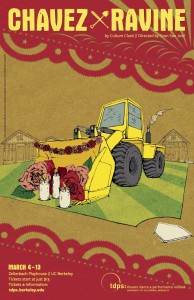Chavez Ravine is a play about people, politics, and change. More specifically, it’s the story of residents displaced from their homes in Los Angeles on land that eventually became Dodger Stadium. Yet to summarize these events into one simple sentence is impossible: the production honors multiple histories, gives visibility to people who have been marginalized, and sparks insights into our current political and economic crises.
 Created and performed by Culture Clash in 2003, Chavez Ravine was remounted this semester at U.C. Berkeley and performances will happen one more weekend: March 11th through 13th. It’s a testament to how collaborative ventures in the arts at Cal generate tremendous insights for students, faculty, and audiences.
Created and performed by Culture Clash in 2003, Chavez Ravine was remounted this semester at U.C. Berkeley and performances will happen one more weekend: March 11th through 13th. It’s a testament to how collaborative ventures in the arts at Cal generate tremendous insights for students, faculty, and audiences.
A post-performance discussion in Zellerbach Playhouse followed the first weekend of shows. Director Sean San José and two of Culture Clash’s founders, Richard Montoya and Herbert Siguenza, joined a conversation facilitated by UC Berkeley professor and playwright Philip Kan Gotanda. They discussed the questions that inspired Chavez Ravine: “Is our city reflected back to us in the people we see on performance stages?” and “Do people making theatre reflect the stories and conflicts of people living today?” They added that performance can be a “buoying force,” one that not only analyzes and critiques social issues but also possesses an affirming and uplifting power, especially as we see communities fight oppression.
The Cal students who perform Chavez Ravine are an impressive group of actors who inhabit and enliven the stories. The cast of 18 brings their talents and power to the production’s dialogue, songs, and dancing in ways that are both winsome and provocative. When the production of Chavez Ravine by Culture Clash had its première in 2003, Gordon Davidson, the artistic director of the Center Theatre Group, jumped up on the stage at the end of the show to congratulate the performers. In a review of that evening, theatre critic Leigh Kennicott describes the significance of the moment, “For Davidson the play represents a longed-for accomplishment of the Center Theatre Group’s primary mission: to reflect and enrich the community.”
Thirteen years later, this production of Chavez Ravine also marks a special accomplishment: it’s the first staging of the play in the Bay Area and the first time it has been done by actors other than Culture Clash. By selecting this play for its performance season, the department of Theater, Dance and Performance Studies exemplifies UC Berkeley’s commitment to engaging the arts and creativity in the service of the public good.
The play opens with a reenactment of Fernando Valenzuela on the mound, pitching for the LA Dodgers in 1981, with his inimitable skyward glances before he threw the ball. The production’s weaving together of people and historical events adds texture and complexity to the narrative. Chavez Ravine is as much a history lesson as it’s political commentary and a statement about ongoing disparities in our economic system.
Just as there are multiple layers to the characters’ stories, the stage itself is a multifaceted place with screens and platforms extending the surfaces on which actors perform. Chavez Ravine reveals how baseball can be a galvanizing force and how the “movers and shakers” of city politics can demolish a low-income community. By connecting people, priorities, and plans, Chavez Ravine gives us an opportunity to learn about history, and through this engagement with the past, we can better see our present moments and our futures.
Chavez Ravine plays March 4-13, 2016, with performances on Fridays & Saturdays at 8:00 PM and Sundays at 2:00 PM in Zellerbach Playhouse on the UC Berkeley Campus. Tickets are $13 to $20 and can be purchased online through the TDPS box office or at the door. For more information, or to buy tickets, please click here.
Kate Mattingly graduated from Princeton University with a degree in Architecture and received her master’s of fine arts degree in Dance from NYU where she performed works by William Forsythe and other choreographers. Her articles about dance have been published in the New York Times, Village Voice, Washington Post, Dance magazine, and Dance Research Journal. From 2006 to 2008 she lived in Austria where she worked as a dramaturg for the contemporary performance festival, Sommer Szene. She is currently a doctoral candidate at UC Berkeley.
